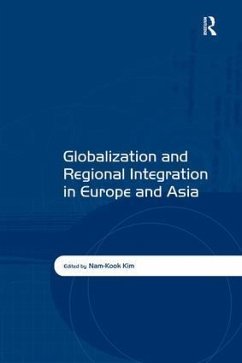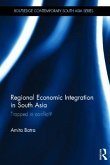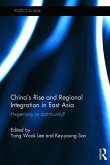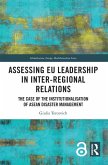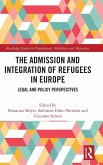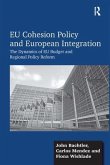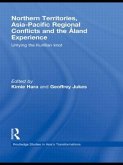Globalization and Regional Integration in Europe and Asia
Herausgeber: Kim, Nam-Kook
Globalization and Regional Integration in Europe and Asia
Herausgeber: Kim, Nam-Kook
- Gebundenes Buch
- Merkliste
- Auf die Merkliste
- Bewerten Bewerten
- Teilen
- Produkt teilen
- Produkterinnerung
- Produkterinnerung
This volume discusses the current trend of globalization and the main characteristics of world order, focusing specifically on the destiny of the nation state, the threat against human rights, and conflicts between unilateral hegemony of the USA and Europe. Comparative in nature, it offers meaningful lessons for the future of nation states and the possibility of building regional communities in Asia.
Andere Kunden interessierten sich auch für
![Regional Economic Integration in South Asia Regional Economic Integration in South Asia]() Amita BatraRegional Economic Integration in South Asia176,99 €
Amita BatraRegional Economic Integration in South Asia176,99 €![China's Rise and Regional Integration in East Asia China's Rise and Regional Integration in East Asia]() China's Rise and Regional Integration in East Asia176,99 €
China's Rise and Regional Integration in East Asia176,99 €![Assessing EU Leadership in Inter-regional Relations Assessing EU Leadership in Inter-regional Relations]() Giulia TercovichAssessing EU Leadership in Inter-regional Relations55,99 €
Giulia TercovichAssessing EU Leadership in Inter-regional Relations55,99 €![The Admission and Integration of Refugees in Europe The Admission and Integration of Refugees in Europe]() The Admission and Integration of Refugees in Europe179,99 €
The Admission and Integration of Refugees in Europe179,99 €![EU Cohesion Policy and European Integration EU Cohesion Policy and European Integration]() John BachtlerEU Cohesion Policy and European Integration168,99 €
John BachtlerEU Cohesion Policy and European Integration168,99 €![Northern Territories, Asia-Pacific Regional Conflicts and the Aland Experience Northern Territories, Asia-Pacific Regional Conflicts and the Aland Experience]() Northern Territories, Asia-Pacific Regional Conflicts and the Aland Experience176,99 €
Northern Territories, Asia-Pacific Regional Conflicts and the Aland Experience176,99 €![Enhancing Asia-Europe Co-operation through Educational Exchange Enhancing Asia-Europe Co-operation through Educational Exchange]() Georg WiessalaEnhancing Asia-Europe Co-operation through Educational Exchange177,99 €
Georg WiessalaEnhancing Asia-Europe Co-operation through Educational Exchange177,99 €-
-
-
This volume discusses the current trend of globalization and the main characteristics of world order, focusing specifically on the destiny of the nation state, the threat against human rights, and conflicts between unilateral hegemony of the USA and Europe. Comparative in nature, it offers meaningful lessons for the future of nation states and the possibility of building regional communities in Asia.
Produktdetails
- Produktdetails
- Verlag: Routledge
- Seitenzahl: 198
- Erscheinungstermin: 7. Juli 2009
- Englisch
- Abmessung: 240mm x 161mm x 15mm
- Gewicht: 467g
- ISBN-13: 9780754676133
- ISBN-10: 0754676137
- Artikelnr.: 35652822
- Herstellerkennzeichnung
- Libri GmbH
- Europaallee 1
- 36244 Bad Hersfeld
- gpsr@libri.de
- Verlag: Routledge
- Seitenzahl: 198
- Erscheinungstermin: 7. Juli 2009
- Englisch
- Abmessung: 240mm x 161mm x 15mm
- Gewicht: 467g
- ISBN-13: 9780754676133
- ISBN-10: 0754676137
- Artikelnr.: 35652822
- Herstellerkennzeichnung
- Libri GmbH
- Europaallee 1
- 36244 Bad Hersfeld
- gpsr@libri.de
Nam-Kook Kim is a Senior Fellow at SNU-KIEP EU Center and Research Professor at the Graduate School of International Studies, Seoul National University, Korea.
Introduction A Framework for Peace in the Era of Globalization, Nam-Kook
Kim; Part 1 Globalization and the New World Order; Chapter 1 American
Primacy and Europeanist Responses, Gowan Peter; Chapter 2 European
Integration and the Future of the Nation State, Jaime Pastor; Chapter 3
1This chapter is a revised version of "Bilateral and Multilateral Economic
Agreements and their Impact on Human Rights of the Beneficiaries", a
working paper submitted to the United Nations Sub-Commission on the
Promotion and Protection of Human Rights in 2006., Chinsung Chung; Part 2
European Experience and Asian Reality; Chapter 4 The European Experience:
The Millionfold Trauma of the Twentieth Century is Still Virulent, Holger
Heide; Chapter 5 1An earlier version of this chapter appeared in Asia
Europe Journal (2008) and is reused here with kind permission of Springer
Science+Business Media. My thanks should go to Lay Hwee Yeo, Philomena
Murray, Martin Holland, Eiji Ogawa, and Chayodom Sabhasri for their
insightful lectures and conversation at the 2008 Seoul Bangkok Summer
School, where I learned a great deal for this chapter., Nam-Kook Kim;
Chapter 6 1Research was initially supported by the Korea Research Fund
(KRF-2003-072-BS2022)., Woosik Moon; Part 3 Imagining an Asian Regional
Community; Chapter 7 1An earlier version of this chapter was presented at
the "War and Peace in the Era of Globalization: Experiences from Europe and
Asia" conference on Jeju Island, June 2007. I am grateful to Nam-Kook Kim
for inviting me to submit this chapter and giving me advice on it, and to
Sam-Sung Lee for helpful comments on it. The research for this chapter was
Part Ially supported by the Grant-in-Aid for Scientific Research
No.20730107 from the Ministry of Education, Culture, Sports, Science, and
Technology of Japan., Motohide Saji; Chapter 8 1The author acknowledges the
Korea Foundation for its generous support of this research project. The
author also extends thanks to Choo Jaewoo, Fang Xiuyu, Guo Dingping, Kim
Changsu, Kim Nam-kook, Lee Yong-joon, and Park Yong-Ok for their academic
comments., Yongtao Liu; Chapter 9 Beyond the East Asian Grand Division:
Imagining an East Asian Peace Belt of Jeju-Okinawa-Taiwan Islands, Samsung
Lee;
Kim; Part 1 Globalization and the New World Order; Chapter 1 American
Primacy and Europeanist Responses, Gowan Peter; Chapter 2 European
Integration and the Future of the Nation State, Jaime Pastor; Chapter 3
1This chapter is a revised version of "Bilateral and Multilateral Economic
Agreements and their Impact on Human Rights of the Beneficiaries", a
working paper submitted to the United Nations Sub-Commission on the
Promotion and Protection of Human Rights in 2006., Chinsung Chung; Part 2
European Experience and Asian Reality; Chapter 4 The European Experience:
The Millionfold Trauma of the Twentieth Century is Still Virulent, Holger
Heide; Chapter 5 1An earlier version of this chapter appeared in Asia
Europe Journal (2008) and is reused here with kind permission of Springer
Science+Business Media. My thanks should go to Lay Hwee Yeo, Philomena
Murray, Martin Holland, Eiji Ogawa, and Chayodom Sabhasri for their
insightful lectures and conversation at the 2008 Seoul Bangkok Summer
School, where I learned a great deal for this chapter., Nam-Kook Kim;
Chapter 6 1Research was initially supported by the Korea Research Fund
(KRF-2003-072-BS2022)., Woosik Moon; Part 3 Imagining an Asian Regional
Community; Chapter 7 1An earlier version of this chapter was presented at
the "War and Peace in the Era of Globalization: Experiences from Europe and
Asia" conference on Jeju Island, June 2007. I am grateful to Nam-Kook Kim
for inviting me to submit this chapter and giving me advice on it, and to
Sam-Sung Lee for helpful comments on it. The research for this chapter was
Part Ially supported by the Grant-in-Aid for Scientific Research
No.20730107 from the Ministry of Education, Culture, Sports, Science, and
Technology of Japan., Motohide Saji; Chapter 8 1The author acknowledges the
Korea Foundation for its generous support of this research project. The
author also extends thanks to Choo Jaewoo, Fang Xiuyu, Guo Dingping, Kim
Changsu, Kim Nam-kook, Lee Yong-joon, and Park Yong-Ok for their academic
comments., Yongtao Liu; Chapter 9 Beyond the East Asian Grand Division:
Imagining an East Asian Peace Belt of Jeju-Okinawa-Taiwan Islands, Samsung
Lee;
Introduction A Framework for Peace in the Era of Globalization, Nam-Kook
Kim; Part 1 Globalization and the New World Order; Chapter 1 American
Primacy and Europeanist Responses, Gowan Peter; Chapter 2 European
Integration and the Future of the Nation State, Jaime Pastor; Chapter 3
1This chapter is a revised version of "Bilateral and Multilateral Economic
Agreements and their Impact on Human Rights of the Beneficiaries", a
working paper submitted to the United Nations Sub-Commission on the
Promotion and Protection of Human Rights in 2006., Chinsung Chung; Part 2
European Experience and Asian Reality; Chapter 4 The European Experience:
The Millionfold Trauma of the Twentieth Century is Still Virulent, Holger
Heide; Chapter 5 1An earlier version of this chapter appeared in Asia
Europe Journal (2008) and is reused here with kind permission of Springer
Science+Business Media. My thanks should go to Lay Hwee Yeo, Philomena
Murray, Martin Holland, Eiji Ogawa, and Chayodom Sabhasri for their
insightful lectures and conversation at the 2008 Seoul Bangkok Summer
School, where I learned a great deal for this chapter., Nam-Kook Kim;
Chapter 6 1Research was initially supported by the Korea Research Fund
(KRF-2003-072-BS2022)., Woosik Moon; Part 3 Imagining an Asian Regional
Community; Chapter 7 1An earlier version of this chapter was presented at
the "War and Peace in the Era of Globalization: Experiences from Europe and
Asia" conference on Jeju Island, June 2007. I am grateful to Nam-Kook Kim
for inviting me to submit this chapter and giving me advice on it, and to
Sam-Sung Lee for helpful comments on it. The research for this chapter was
Part Ially supported by the Grant-in-Aid for Scientific Research
No.20730107 from the Ministry of Education, Culture, Sports, Science, and
Technology of Japan., Motohide Saji; Chapter 8 1The author acknowledges the
Korea Foundation for its generous support of this research project. The
author also extends thanks to Choo Jaewoo, Fang Xiuyu, Guo Dingping, Kim
Changsu, Kim Nam-kook, Lee Yong-joon, and Park Yong-Ok for their academic
comments., Yongtao Liu; Chapter 9 Beyond the East Asian Grand Division:
Imagining an East Asian Peace Belt of Jeju-Okinawa-Taiwan Islands, Samsung
Lee;
Kim; Part 1 Globalization and the New World Order; Chapter 1 American
Primacy and Europeanist Responses, Gowan Peter; Chapter 2 European
Integration and the Future of the Nation State, Jaime Pastor; Chapter 3
1This chapter is a revised version of "Bilateral and Multilateral Economic
Agreements and their Impact on Human Rights of the Beneficiaries", a
working paper submitted to the United Nations Sub-Commission on the
Promotion and Protection of Human Rights in 2006., Chinsung Chung; Part 2
European Experience and Asian Reality; Chapter 4 The European Experience:
The Millionfold Trauma of the Twentieth Century is Still Virulent, Holger
Heide; Chapter 5 1An earlier version of this chapter appeared in Asia
Europe Journal (2008) and is reused here with kind permission of Springer
Science+Business Media. My thanks should go to Lay Hwee Yeo, Philomena
Murray, Martin Holland, Eiji Ogawa, and Chayodom Sabhasri for their
insightful lectures and conversation at the 2008 Seoul Bangkok Summer
School, where I learned a great deal for this chapter., Nam-Kook Kim;
Chapter 6 1Research was initially supported by the Korea Research Fund
(KRF-2003-072-BS2022)., Woosik Moon; Part 3 Imagining an Asian Regional
Community; Chapter 7 1An earlier version of this chapter was presented at
the "War and Peace in the Era of Globalization: Experiences from Europe and
Asia" conference on Jeju Island, June 2007. I am grateful to Nam-Kook Kim
for inviting me to submit this chapter and giving me advice on it, and to
Sam-Sung Lee for helpful comments on it. The research for this chapter was
Part Ially supported by the Grant-in-Aid for Scientific Research
No.20730107 from the Ministry of Education, Culture, Sports, Science, and
Technology of Japan., Motohide Saji; Chapter 8 1The author acknowledges the
Korea Foundation for its generous support of this research project. The
author also extends thanks to Choo Jaewoo, Fang Xiuyu, Guo Dingping, Kim
Changsu, Kim Nam-kook, Lee Yong-joon, and Park Yong-Ok for their academic
comments., Yongtao Liu; Chapter 9 Beyond the East Asian Grand Division:
Imagining an East Asian Peace Belt of Jeju-Okinawa-Taiwan Islands, Samsung
Lee;

